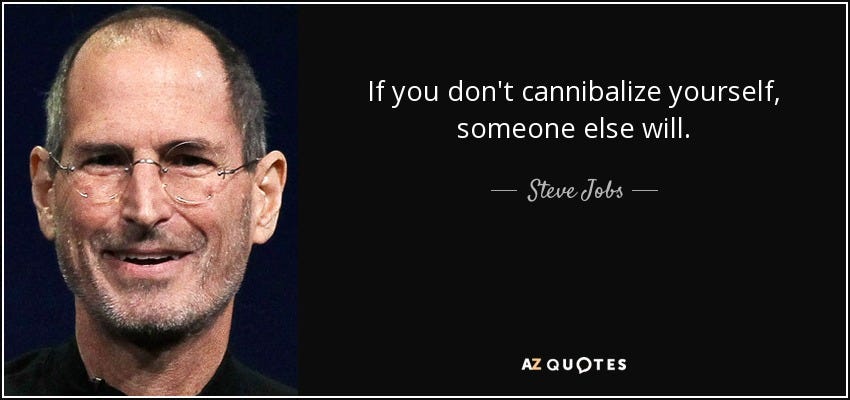When VR Might Cannibalize Your Existing Business Offerings
"They need to consider exactly how it might cannibalise their existing business offerings."
That's how one Snobal team member described a conversation a while back with a large organisation looking to have some of their training packages adapted to VR so as to complement existing in real life training and development offerings.
Steve Jobs (0101). “Motivating Thoughts of Steve Jobs”, p.29, Prabhat Prakashan
When Current Plans and Products Are 'Aging Out'
The driver was that organisation was aware its existing offerings may be aging out. Now now. Not next week. But disruption was coming down the line and they wanted to be prepared. Innovation was happening in their sector through the use of digital including VR. VR also provided exciting possibilities through enhanced engagement, convenience, data, availability and cost.
Innovator’s dilemma happens when a good business overlooks apparent smaller but potentially disruptive opportunities in favor of its existing high-margin business. Source: FutureStartp.com
Currently the organisation delivered all their training on site, using real actors, costumes, script design and a location - with props. It required trainees to travel to a location, spend a day out of their workday on site receiving the training. The training was expensive and time consuming to deliver. What's more it wasn't scalable.
The organisation were excited about VR giving them a huge competitive uptick. It would potentially place their expert content onto a national stage with the ability to unlock customers nationally, thereby penetrating into new markets. But underneath the discussion on the potential was a note of fear.
How would they package the VR training with their existing offering? What would they keep, what would they let go? If they were going to provide VR of one training package, then why not all?
How could they best offer a blended experience? Adapting all or a large part of their training to VR meant they wouldn't need any or as many actors or coordinators. What would this mean for their training team and learning designers? And what did this mean for the business as a whole?
When a 'future focussed pivot' is best
The issue came down in one sense to strategy. Or rather what to do when a strategy no longer serves an organisation and needs to be reconsidered - or replaced.
Take Ford.
As this insightful article on business improvement from management consulting firm Kaufman Hall articulates, in 1908, Ford first produced the Model T automobile tailored to the broadest market. But then over 100 yrs later, in 2018, Ford announced that it would stop making all U.S. internal-combustion sedans except the Mustang.
All organizations... need to confront the fact that no strategic plan lasts forever.
Why? Why did this world leading brand decide to ditch its core strategy? To stop producing something that had been a core of its history? The answer, as the article outlines - a 'future-focused pivot'. To electric vehicles.
Ford looked at its business, its core product, its offering and the market. It looked at what was successful and what needed to be left behind. It made a decision and moved forward.
Drivers to Update Strategic Plans
Often common business practise says changes to strategy plans can be signalled by four key drivers:
1. Funding environment changes
2. Policy environment changes
3. Competitive environment changes
4. Leadership changes
We'd like to add one more.
5. Technological changes
What struck you most about Ford's pivot and what lessons this might give to organisations looking to harness new technologies such as VR/AR? We'd love to hear.
And if you're interested in reading more of the Innovators Dilemma check out this article.
In case you missed it
Measuring the Metaverse: Meta has partnered with with the research arm of The Economist the Economist Impact to undertake a "foundational research program" - The Inclusive Internet Index (#3i), to support the development of an "indicator framework that measures metaverse readiness at the country level". More>
The Metabanks are coming: a new Deloitte report cautions banks to prepare for the next paradigm shift finding that "the evolution of customers' behaviours, combined with generational change and technological evolution, is pushing banking boundaries beyond 2D digital". More>
Until next time.If you have any questions or would like to know more about Snobal reach out - hello@snobal.io.

